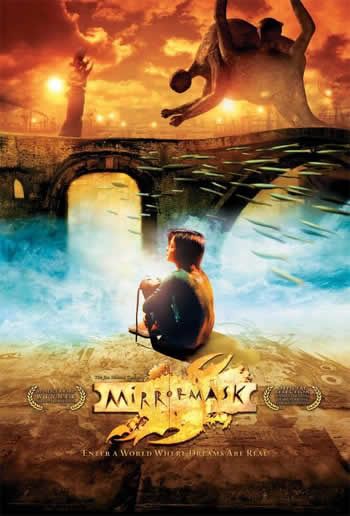
Neil Gaiman is my favorite fantasy author. His fantasy tends towards the dark and fantastic, or towards the real world with something just off. I've read most of his works; people are most familiar with his Sandman graphic novels or with his recent bestselling book American Gods. Neil also dabbles in screenwriting.
Dave McKean, the graphic artist, is a longtime collaorator of Neil. His work is... strange. He works in multiple media to create works that are just as off in terms of visual impact, as Neil's works tend to be off in terms of ideas and concepts. They complement each other very well in the published medium.
So. When word reached their fans that they were working on a film project, there was quite a bit of excitement. The budget wasn't big, and the film wasn't meant to be a Hollywood summer blockbuster, but even small art house runs were greatly anticipated by fans. They collaborated on the screenplay, and Dave took the director's chair.
The greatest success of Mirrormask is the near-perfect translation of Dave McKean's visual style to film. Everything from the dark reds, oranges, yellows and browns he tends to use, to the strangeness, to the twisted analogs of real-world things. The transition is spectacular, if a bit disturbing. If you like looking at these kinds of interesting imagery, you'll have a lot to see.
Unfortunately, what Dave doesn't quite get done is a proper application of film elements to the storytelling. Mirrormask is essentially a buddy road trip. The main character, Helena, is trapped in a fantasy world of her own making and needs to quest to rights a wrong and escape back to her world. Her sidekick is Valentine. Think C3PO with less poise and intellect.
The story is pretty simple. Since it's Gaiman, there are a few twists, but nothing you can't wrap your head around. The problem is in the actors and the pacing. Stephanie Leonidas is a reasonably-experienced 20-year old actress, but McKean gets very little from her emotion-wise. She's unable to project, and the result is an audience that is less-than-invested in her as a character. This is an even bigger problem because Helena's main trait that sets her off from the denizens of the fantasy world is her expressive face. Everyone else wears a mask. She might as well be wearing one too for the most part.
The story's pacing also leaves much to be desired. I know that Dave's visuals are a huge part of the film, but editing Mirromask into a properly-paced film must take precedence. It didn't, and you have a story that's unable to hold the interest of viewers as the characters skitter back and forth. The pretty pictures can only take you so far.
My favorite scene in a film that otherwise tested my patience was a very strange use of the Carpenter's standard "Close to You". If you see the film, I'll bet you'll find that bit at least noteworthy if not entertaining.
Bottom Line: I'm sure that Mirrormask has an audience, and will develop a cult following just because it looks so damned cool. However, I wouldn't watch it all the way through more than once without liberal use of fast forward. If you're a fan of Gaiman and/or McKean though, it's required viewing.
No comments:
Post a Comment